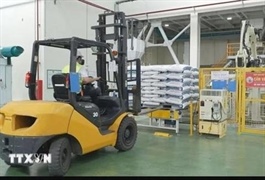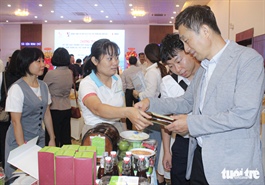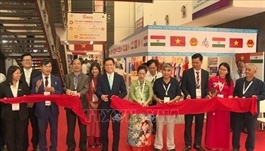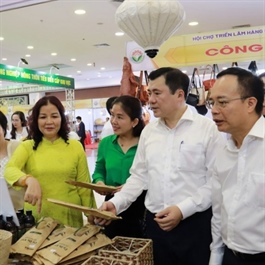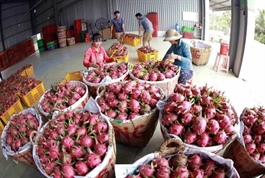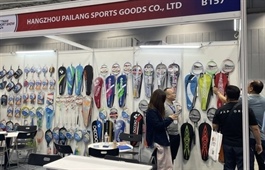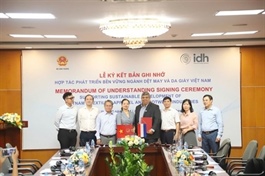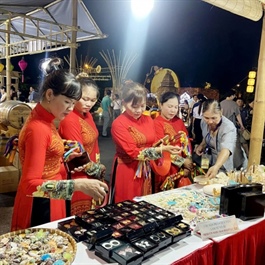Hanoi advances supporting industries for hi-tech services
Hanoi advances supporting industries for hi-tech services
The global commercial aviation market is expected to grow at an annual rate of about 5%, with Vietnam ranking 5th globally and 1st in Southeast Asia in aviation market growth.
Hanoi's supporting industries aim to attract businesses to invest in mechanics, manufacturing, electronics, IT, and high-tech sectors, especially aviation, within the Hanoi Southern Supporting Industrial Park (HANSSIP) and city industrial zones.
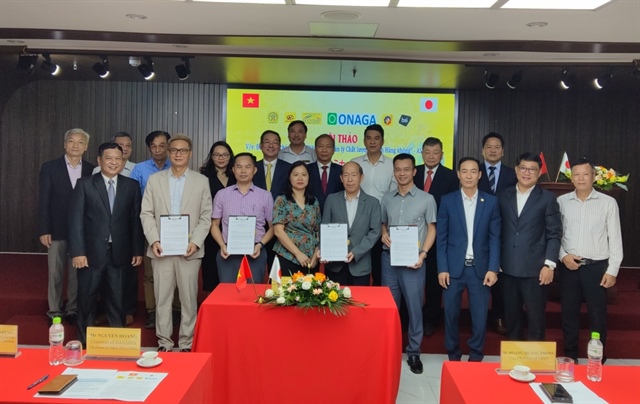
Delegates at the workshop. Photos: Khac Kien/The Hanoi Times |
Vice Director of the Hanoi Department of Industry and Trade Nguyen Dinh Thang shared the information during a workshop on the aerospace quality management system AS9100 certificate, held in Hanoi this week.
“The city encourages businesses to focus on research, boost investment, and quickly implement AS9100 certification to qualify for participation in domestic and international supply chains,” he said.
At the workshop, Takayuki Ishida, CEO of VI-JA CID (a consulting firm for supporting industries), provided an overview of AS9100 certification. AS9100 is widely applied in the aerospace industry, covering manufacturing, maintenance, repair, and distribution. It follows a structure similar to ISO 9001, emphasizing key elements such as organizational leadership in quality management, risk-based thinking, identifying risks and implementing countermeasures, strict processes to ensure product safety and reliability, product traceability, corrective actions, and continuous improvement processes.
Achieving AS9100 certification enhances a company's global reputation, improves trust among business partners and customers, reduces costs through better risk management, increases operational efficiency and productivity, and is often required for bidding in the aerospace and defense sectors.
To be AS9100 certified, a company must establish a quality management system based on the standards, conduct internal audits, undergo third-party certification assessments, and meet the required criteria to obtain certification.
"Compliance with AS9100 standards allows businesses to boost their international competitiveness and deliver higher-quality products and services," emphasized Takayuki Ishida.
Onaga Masaru, Chairman of Onaga Vietnam, highlighted that the demand for commercial aircraft over the next 20 years is projected at around 36,000 units. The global commercial aviation market is expected to grow at an annual rate of about 5%, with Vietnam ranking 5th globally and 1st in Southeast Asia in aviation market growth.
In 2023, Vietnam welcomed 12.6 million international visitors, a 3.4-fold increase from the previous year. Vietnam Airlines and Vietjet Air saw revenue and profit growth as travel demand rebounded. By 2024, the number of tourists is expected to reach pre-pandemic levels, with demand continuing to rise.
Onaga Masaru also noted that aircraft manufacturing is a relatively new industry in Vietnam, and currently, no domestic producers meet the standards to participate in the aerospace supply chain. However, Boeing, the American aircraft manufacturer, is showing interest in the Vietnamese market and is opening up business opportunities, particularly for supporting industry enterprises.
Nguyen Hong Phong, CEO of An Mi Tools, one of the companies that signed contracts to consult on investment in the global aerospace supply chain, shared insights from the workshop. Experts provided comprehensive information on AS9100 certification. European and American airlines are actively seeking manufacturing partners in Vietnam to shift their supply chains, presenting a significant opportunity for Vietnamese businesses.
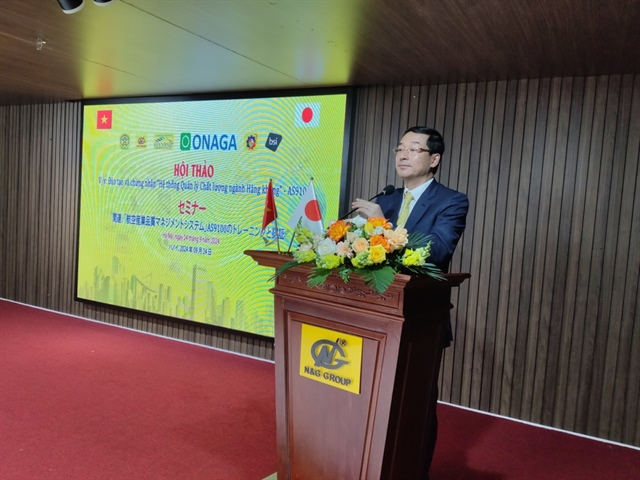
HANSIBA Chairman Nguyen Hoang at the event. |
However, Phong pointed out that while the projected increase in aircraft demand over the next 20 years is promising, the initial phase for Vietnamese companies to enter the supply chain is challenging, costly, and carries a high risk of failure. Many businesses are still assessing the nature of the industry, along with critical factors like order stability and volume.
Nguyen Hoang, Chairman of the Hanoi Supporting Industry Business Association (HANSIBA), stated that Vietnam's aerospace manufacturing industry has seen rapid development in recent years. Aerospace manufacturing plays a crucial role in realizing Vietnam's industrialization strategy, with a focus on high-tech industries and supporting technologies. In this context, HANSIBA, N&G Holdings Group, and 10 member companies of the Kobe Aerospace Network (KAN) from Japan recently signed a cooperation agreement to establish the Vietnam-Japan Techno Park Complex.
Under this agreement, KAN and HANSIBA member companies will collaborate on technology, production processes, and particularly on global manufacturing certification. Meeting international technical and quality standards in aerospace manufacturing is essential for Vietnamese companies to join the global aerospace supply chain. "AS9100 training and certification will help Vietnamese businesses access the global aerospace production chain," said Nguyen Hoang.
Hoang Quang Phong, Vice Chairman of the Vietnam Chamber of Commerce and Industry (VCCI), remarked that the aerospace sector is a modern industry that showcases the ambition and readiness of Vietnamese enterprises to contribute to the development of global advanced industries. It also reflects the trust of Vietnamese businesses in Japanese technology.
"We recognize the seriousness of Japanese businesses in their investments, operations, and labor relations in Vietnam. The collaboration between Vietnam's supporting industry enterprises in production and services will yield positive results for both sides, enabling joint participation in the global supply chain," said Phong.




